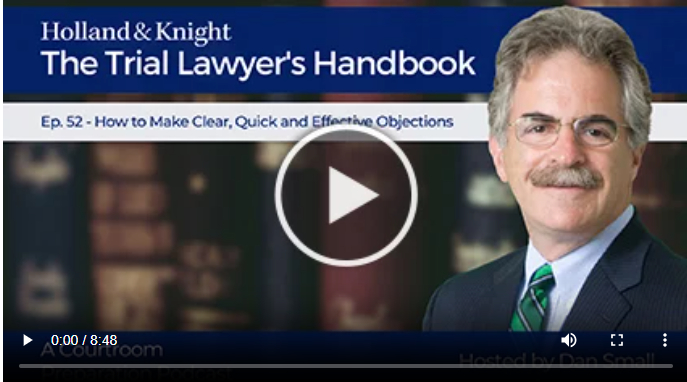In this episode of "The Trial Lawyer's Handbook" podcast series, litigation attorney Dan Small addresses the art of making effective objections during trial, highlighting the importance of preparation, quick thinking and poise. He delves into strategies for anticipating objections, the significance of listening intently to catch leading questions and the proper manner to object and respond to objections. Mr. Small stresses that beyond preventing unfavorable evidence, objections serve to preserve issues for appeal, underscoring their pivotal role in successful trial advocacy.
Listen and subscribe on Amazon.
Listen and subscribe on Apple Podcasts.
Listen and subscribe on SoundCloud.
Listen and subscribe on Spotify.
Watch and subscribe on YouTube.
Mr. Small is also the author of the new American Bar Association (ABA) book Lessons Learned from a Life on Trial: Landmark Cases from a Veteran Litigator and what They Can Teach Trial Lawyers.
Podcast Transcript
Dan Small: Like everything else that happens in a trial, making effective objections requires care and discipline. And even though objections normally have to be made almost instantaneously, that does not mean that preparation is unnecessary or unimportant. Here are some practice pointers to keep in mind.
First, as to preparing for objections, be ready. Certainly, there will always be surprises at trial. Objections to the form of a question, such as leading or compound, can't usually be anticipated, but substantive objections such as hearsay or the admissibility of a document usually can be anticipated, and those are the ones that matter the most. Don't just focus on your own case. Think about what your opponent is likely to do and how you might respond. Outline your arguments and have them available. The ability to think on your feet is an important characteristic of a good trial lawyer, but it is not a substitute for careful preparation.
Next, be poised. You will have only a split second to rise to your feet and object. Be poised to do it. Don't sprawl back in your chair with your legs crossed. It will take too much time for you to get to your feet. And as your grade school teacher might have said, such a posture is not conducive to paying close attention. Sit upright at the edge of your chair, feet on the ground, ready to move.
Next, listen. Objections have to be timely. To accomplish this, you have to be focused, listening with a degree of intensity that we don't bring to bear in our normal conversations. Many times you'll know that the question is objectionable before it's even finished. Begin to stand up to draw the court's attention during your opponent's direct examination. You should be listening in particular for leading questions, that is, questions that suggest the answer.
Here are some tips for recognizing leading questions early. Questions that start with "Who?" "What?" "When?" "Why?" "Where?" are rarely leading. Those are the words that we talked about as the keys to a good direct examination. But often, almost always leading are questions that start with the "D" words: "did," "do," "didn't," "don't" and also "have" or "were" or similar words. The majority of leading questions on direct examination begin with the word "did." Try it yourself. Try to formulate a question starting with "did" that's not leading. It's hard to do. And then always leading. Questions that start with "isn't it true?" or "it's fair to say" or "would you say" or "you would agree that" and questions that end with "isn't that true?" or "right?" or "correct?" — those are all going to be leading.
Next, making objections. Objections should be stated clearly and directly. Speak up, but don't shout. Make your objection calm and professional. Avoid eye rolling, sighing or other expressions of exasperation or frustration. It's not helpful, it's not professional, and the jury won't like it.
Next, the content of objections. Most judges require that objections be made in succinct form, either by only using the word "objection" or by adding a shorthand description such as "objection, hearsay." It's rarely necessary to cite a specific rule of evidence in the initial objection. Judges are normally concerned with preventing legal arguments in front of the jury, and they want to minimize the number of sidebar conferences to keep the case moving along.
Next, the timing of objections. Objections need to be timely. If you're objecting to a question, do it before the answer comes out. If you're slow on the trigger and the jury hears the answer, move immediately to strike. If it's really bad, ask for an instruction to disregard. But understand that it's hard to un-ring the bell. Get up. Object. Try to prevent objectionable testimony. Many lawyers believe it's improper, or maybe even impolite, to interrupt an opening statement or a closing argument with an objection. Instead, the lawyer will wait until the argument is concluded and make an objection at sidebar. That's true for minor issues, but if there's a clear misstatement of law or fact or other clearly improper argument, don't wait. If your opponent is clearly making an improper argument, you should try to stop it right then and there. Don't wait until the cow's out of the barn. If you need a corrective instruction, the time to do it is now. If you need to object, don't wait.
Next, reacting to objections. If you're the one asking the questions and the judge sustains an objection to your question, don't panic. It's often hard to think clearly on your feet, especially if you're inexperienced. But even if you're very experienced, even if you know what was wrong with the question, it may be difficult to formulate a proper one right on the spot. Needless to say, the more prepared you are, the less likely this is to happen. But think carefully about the difference between an objection to the form of the question and an objection to the substance of the question. If an objection is to the form of the question, but the substance is a valid line of questioning, don't give up on a good line of questioning just because you asked it badly. Stop and try again. If the objection is to the substance and that objection is sustained, be prepared to move on. But don't let objections throw you. If you are clearly thrown by an objection, guess what? You're going to get a lot more of them. If you're confused by the judge's ruling, or you think you need to explain the issue to the judge, ask to be heard at sidebar. Yes, a judge may refuse to let you explain, but you won't know unless you ask. Further, some objections are sustained for narrow or technical reasons, and a slightly different angle of attack may succeed. Don't quit just because you hit a speed bump. If the judge overrules or sustains an objection, whether it's your objection or your opponent's, say nothing in response, especially if you're on the losing end.
And finally, the purpose of objections. Don't forget what you're trying to accomplish. Yes, you may be trying to keep something out of evidence or force your opponent to obey the rules. But you're also preserving an issue for appeal. If you get an unfavorable ruling, you may need to protect the record by making an offer of proof. This is accomplished by stating at sidebar, of course, what the expected answer to the question would have been, or asking that the excluded document be marked for identification and put into the record.
Objections are a critical part of trial practice. Learn how to make them quickly, clearly and effectively, and take the time to do them right.
The content of this article is intended to provide a general guide to the subject matter. Specialist advice should be sought about your specific circumstances.


